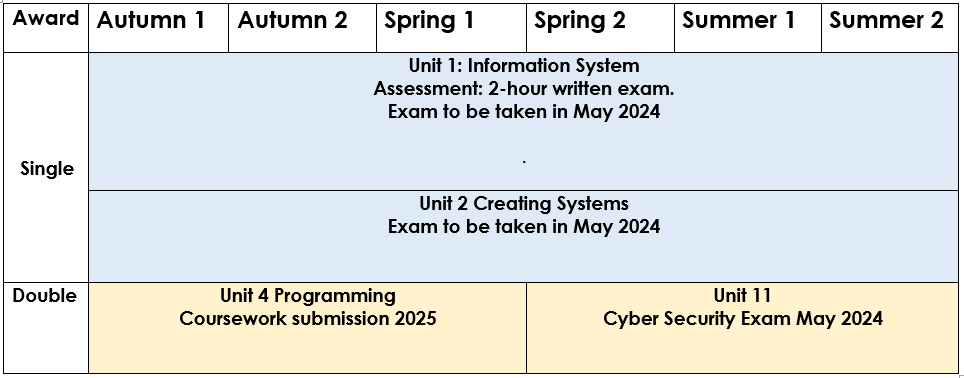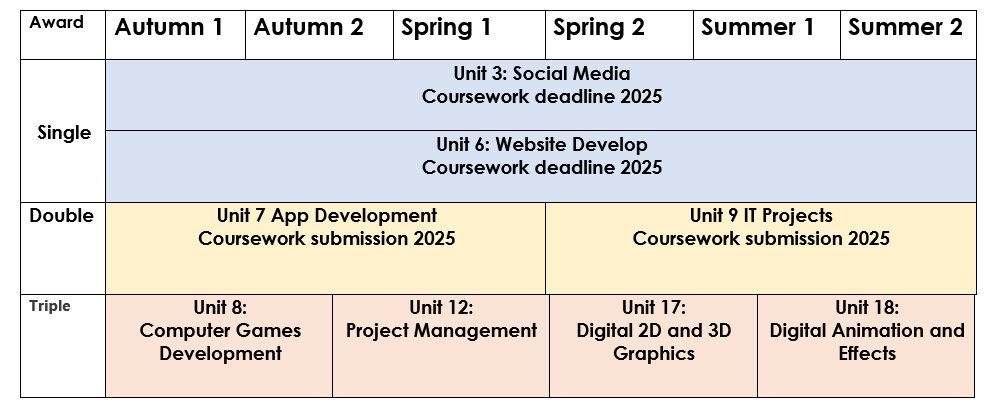Intent
At Grace Academy Darlaston, our computing and ICT curriculum is crafted to offer students both theoretical understanding and hands-on skills, preparing them effectively for the challenges of the contemporary digital world.
Key Stage 3 (Years 7-9): Building Foundations
In Year 7, we prioritize Digital Literacy, laying the groundwork for a solid understanding of everyday information technology. Students develop crucial skills involving e-safety, hardware, and software knowledge, and even delve into Scratch programming.

Progressing to Year 8, we unravel the interplay between computer hardware and software. Students explore programming languages, honing their problem-solving skills. Creative exploration continues as we delve into advanced Computing concepts using specialised software Python Programming, along with deepening theoretical insights into user interfaces and spreadsheets.

In Year 9 as students immerse themselves in user interface design, crafting digital experiences, and refining their spreadsheet skills. This holistic approach to digital literacy ensures a robust foundation in information technology for future success.
Students are assessed through paper assessments, online quizzes, and practical tasks for each topic.

Useful websites for revision and additional support:
Oak resources
https://classroom.thenational.academy/subjects-by-key-stage/key-stage-3/subjects/computing
BBC Bitesize
https://www.bbc.co.uk/bitesize/subjects/zvc9q6f
Online Scratch Game maker
Key Stage 4 (Year 10-11): Real-World Readiness
Year 10 marks a significant step forward as students delve into the BTEC Tech Award Digital Information Technology (DIT) program. This vocational course provides hands-on experience through components such as User Interface Design, Data Collection, and Effective Digital Working Practices.

Year 11 is dedicated to completing coursework and external exams, ensuring practical skills and real-world readiness. Students develop an understanding of how organizations utilize digital systems, emphasizing learning that prepares them for the ever-expanding opportunities in the world of IT and Computer Science.
Assessment includes coursework, mocks, and various evaluations.

Useful websites for revision and additional support:
Spreadsheet Revision
https://edu.gcfglobal.org/en/excel2016/
Revision Website
St Nicks IT and Media Videos and tutorials for BTEC DIT –
https://www.youtube.com/watch?list=PLmyUnKEeJk-gijRiVKEfcvZhwcj6LWpo&v=tewbD0YL_QU&app=desktop
Mr Aliz Class Videos and tutorials for BTEC DIT, easy to follow walk throughs of Component 2 – https://www.youtube.com/watch?v=I-nCMz0xGwI&list=PLedr3UVfNWELEGr-7aupJ_qPQLzplLk1Y&pbjreload=10
KS4 BTEC Digital Information Technology
The Edexcel BTEC Digital Information Technology course equips students with essential skills in digital information technology, encompassing project planning, user interface design, data presentation, and interpretation. The course delves into foundational processes like project planning, iterative design, cyber security, virtual teams, and adherence to legal and ethical codes.
Course Information: This qualification is structured as follows:
Component 1: Exploring User Interface Design Principles and Project Planning Techniques
- Internally assessed assignment contributing to 30% of the overall grade.
- Exploration of user interface design principles and project planning techniques.
- Task: Plan and build a User Interface for a stadium information system.
- Completion Window: January to May Year 10
Component 2: Collecting, Presenting and Interpreting Data
- Internally assessed assignment contributing to 30% of the overall grade.
- Focus on collecting, presenting, and interpreting data.
- Task: Design and build a data dashboard in Microsoft Excel.
- Completion Window: September to December Year 11
Component 3: Effective Digital Working Practices (Year 11)
- Compulsory unit covering topics such as cloud computing, hacking, malware, and computer legislation.
- Externally assessed exam, 1.5 hrs, at the end of May Year 11
- Contributes to 40% of the overall grade.
KS5
Introduction
In our society, IT plays a crucial role across various industries like entertainment, banking, and manufacturing. The constant growth in ICT services, networking, and data management is a significant feature of global economies, making the IT job market robust and well-compensated.
Embarking on this two-year ICT program is an exciting journey into the heart of cutting-edge technology and its pivotal role in diverse industries. It’s not just about learning; it’s about immersing yourself in a world where you gain a profound understanding of various ICT specialisms and witness first-hand how technology underpins business operations.
This program offers a unique blend of theoretical knowledge and hands-on experiences, providing you with the skills needed to navigate the dynamic landscape of the IT industry. By the end, you’ll not only have a comprehensive understanding of ICT but also be well-prepared to contribute to the ever-evolving tech-driven future.
What will I be studying?
This course incorporates the most up-to-date knowledge and skills to enable progression to higher education and employment. Students study the relationship between hardware, software and managing and communicating information and data across a range of different software. E.g. Excel & Access. In addition to this, you will also cover a wide range of computing related topics. Students will study internally assessed units in programming with Python, App development for iOS or Android and successful project management. Students will also undertake an onscreen exam focused on cyber security and incident management.
What skills will I be learning?
Students will develop the transferable skills of numeracy, communication, ICT and the application, presentation, interpretation, analysis and evaluation of information. Students will also develop skills to successfully manage their time and resources. Students will also learnt fundamental programming and logic theories including Selection and Iteration statements.
Key Stage 5 (Year 12-13): Application and Specialization
In our BTEC IT program, students opt for either a BTEC National Extended Certificate or IT Diploma. The curriculum applies classroom knowledge to real-world scenarios.
Year 12 explores IT systems in organisations, with both programs covering exam units—Information Technology Systems and Creating Systems to Manage Data. The Diploma includes Cyber Security and Programming units. All courses let students apply knowledge to case studies, linking to future employment.
BTEC IT Double
Unit 4 Programming
Coursework submission 2025
This unit, assessed internally, allows you to explore computer programming concepts and their real-world applications.
You’ll develop analytical thinking skills by exploring various programming approaches for problem-solving.
By the end of the unit, you’ll be adept at understanding client needs and creating solutions to meet specific requirements.
Unit 11
Cyber Security Exam May 2024
In today’s tech-driven world, safeguarding computer systems from threats, accidents, and disasters is crucial.
This unit delves into the dynamic realm of cybersecurity, covering threats, protection methods, and how to handle security incidents.
Key skills include understanding network architectures, identifying threats and vulnerabilities, assessing risks, collecting evidence forensically, and crafting comprehensive security plans.

In Year 13, Extended Certificate students finish two internally assessed coursework units—Social Media in Business and Website Development. The units let students research and broaden their knowledge. Diploma students complete two units in Mobile App Development and Project Planning, linking strategies for comprehensive learning.
Year 13
Single
Unit 3: Social Media
Coursework deadline 2025
In this unit, we’ll delve into using social media beyond personal connections. Social media isn’t just for friends; it’s a powerful tool for businesses too. You’ll explore various platforms, learn how businesses can use them, and understand the potential challenges.
Your task is to create a plan for using social media strategically in a business context to meet specific goals. You’ll put the plan into action—creating and sharing content, engaging with others. Finally, you’ll assess the impact by collecting data on how social media is helping the business and review the success of your efforts.
Unit 6: Website Develop
Coursework deadline 2025
In today’s digital landscape, organizations heavily rely on websites for customer engagement and revenue. As a website developer, your child plays a crucial role in ensuring these platforms are not just functional but also captivating and innovative.
This unit equips them with skills in scripting languages like HTML, CSS, and JavaScript®, enabling them to analyse and enhance existing websites. The assessment, done through an internally set assignment during class. This unit not only prepares them for a career in website development but also provides a solid foundation for potential higher education pursuits.
Double BTEC IT
Unit 7 App Development
Coursework submission 2025
In this unit, students will explore mobile apps, the corresponding devices, and their societal applications. The focus then shifts to designing and developing their own apps for mobile devices.
Given the significant growth of the mobile technology industry and the increasing importance of mobile apps for organizations, students can expect to encounter numerous real-life examples during the course.
Unit 9 IT Projects
Coursework submission 2025
This unit is essential, providing students with the opportunity to delve into project management principles and various methodologies.
In the context of IT projects, establishing structure and a formal process is vital to avoid project setbacks and failures.
Throughout the unit, students will receive guidance in developing crucial project management skills based on five key principles.
Triple BTEC IT
Unit 8 Computer Games development
Coursework submission 2025
In this module, you’ll explore the technologies employed in the computer gaming industry and their effects on users, developers, and organizations. You’ll examine how user requirements influence game design and how the chosen technologies shape the overall development process of a computer game.
Unit 12:
Project Management
Coursework submission 2025
For this module students will explorer the essentials of IT support and system management crucial for organizational efficiency. This unit covers practical activities, legal considerations, and the preparation of support plans. Ideal for higher education preparation or entering the IT sector. Boost your communication, problem-solving, and planning skills valued by employers.
| Unit 17: |
Digital 2D and 3D Graphics
Coursework submission 2025
Students will dive into the world of digital graphics! Learn the ins and outs of 2D and 3D graphics, from user interfaces to websites and computer games. Explore technical aspects, legal requirements, and the impact of technology on usability. Use specialized software and hardware to design graphics for various purposes. Gain valuable skills in visual communication, planning, and design—ideal for higher education or entering the IT workplace.
| Unit 18: |
Digital 2D and 3D Graphics
Students will discover their purpose and characteristics, from standalone products to enhancing other media like films, ads, and games. They will Dive into legal requirements and technical aspects, exploring creation techniques and principles. Design and craft your own digital animation and effects using specialized software and hardware. Gain valuable communication, planning, and design skills, ideal for higher education, IT apprenticeships, or the workplace. Let your creativity soar in this exciting unit!

Useful websites for revision and additional support:
https://www.knowitallninja.com/
FUTURE OPPORTUNITIES
This qualification is widely recognized by higher education institutions, meeting admission criteria for various business courses at degree, foundation degree, or HND levels. When combined with other qualifications in a study program, learners can pursue higher education through joint courses. It’s recommended to check entry requirements with respective providers.
After completing this qualification, learners can enter the workforce directly, although many may choose further education first. Job opportunities include junior roles in marketing, administration, finance, events management, HR, and related fields, including higher apprenticeships.

